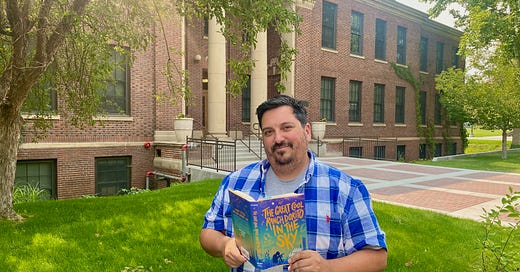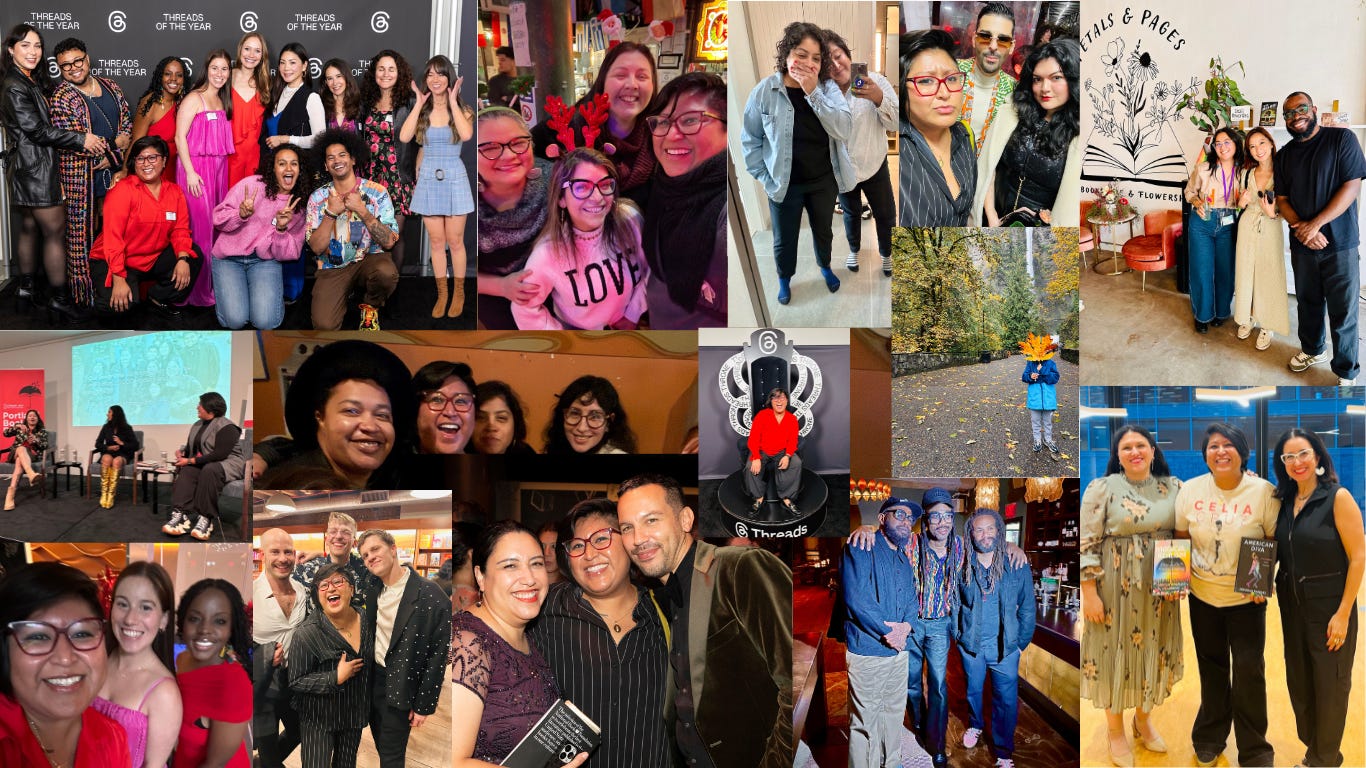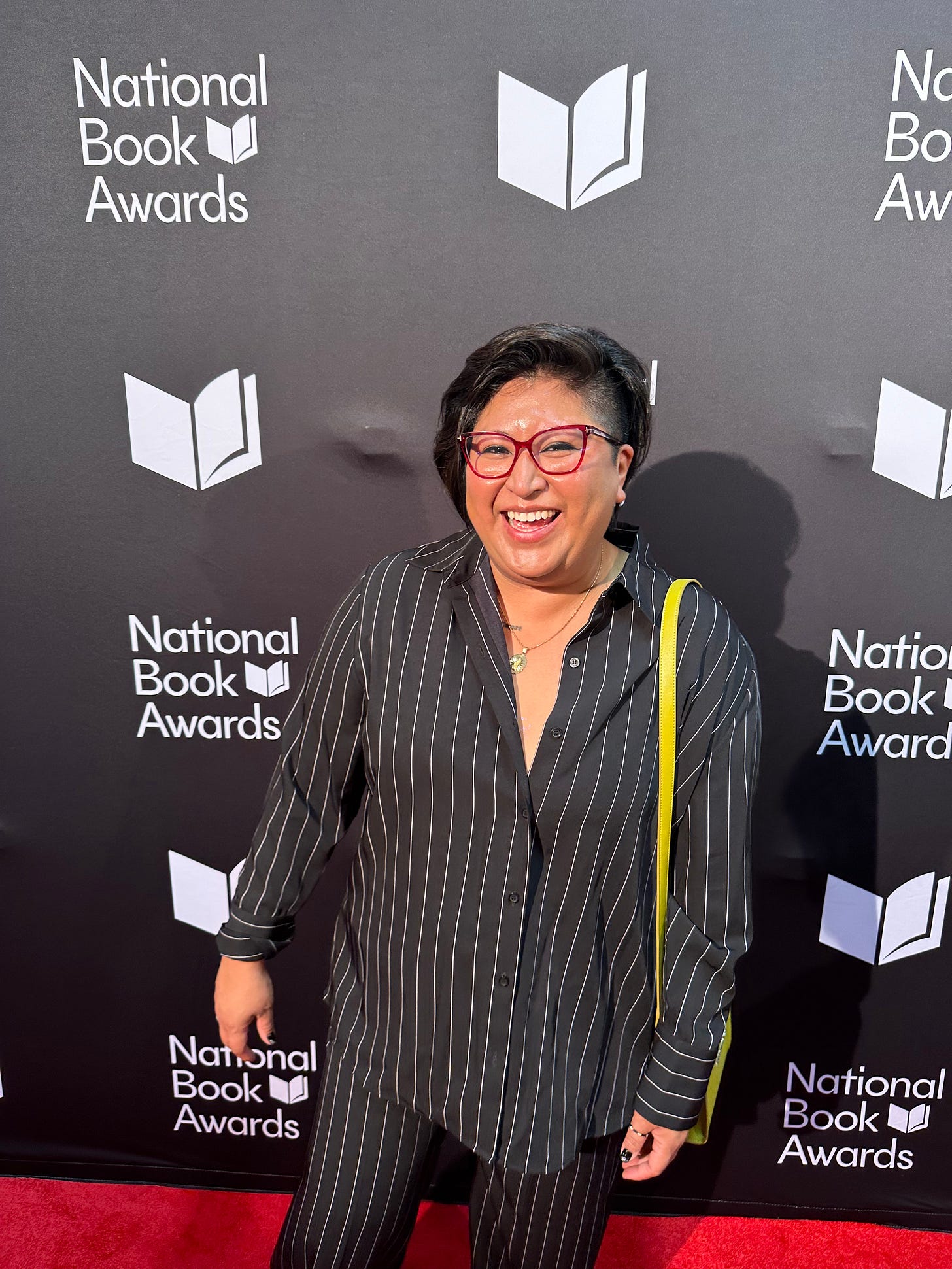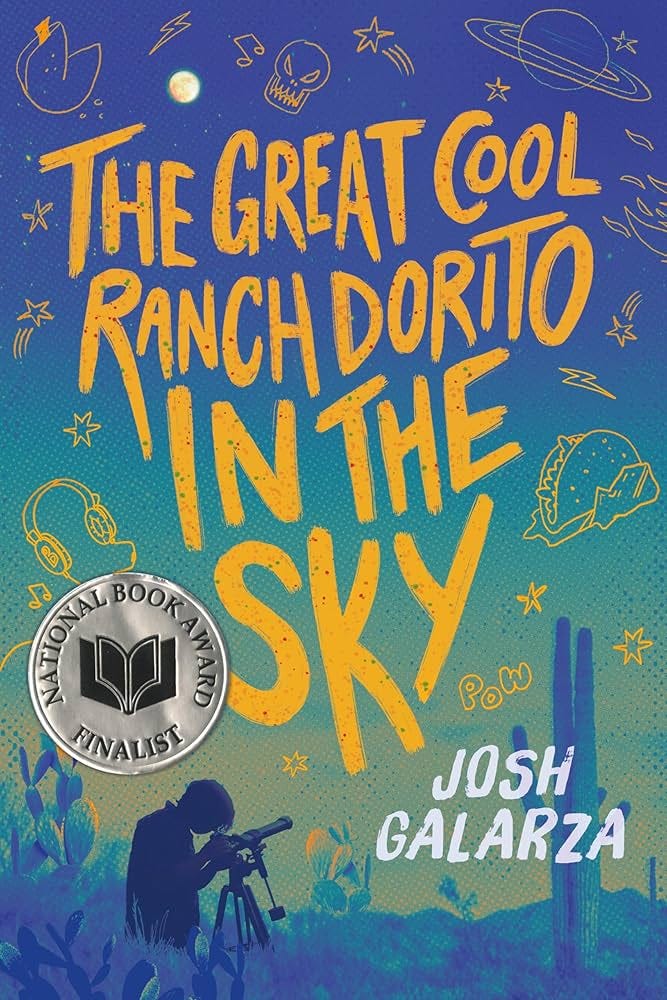#NuevasPáginas: A love letter to Tucson
with Josh Galarza author of 'The Great Cool Ranch Dorito In The Sky'
Hey Book Franz,
Happy Holiday season. I went on an unexpected hiatus from this space! I have traveled a lot since the end of September for bookish reasons, such as moderating author chats, workshops, and attending events. It’s been a whirlwind these past few weeks, but the thing most present in my mind was returning here.
Not only because I’ve got so many awesome author interviews to share with you but also because I’d love to talk about BOOKS! I haven’t read as much as I wanted to read this year but I’ve read some amazing books that deserve to be reviewed in a longer format outside of an Instagram caption. But, I want to know what have you read and loved? What are your favorite books of 2024? Share them with me in the comments below.
I’m excited about this author's interview because the featured book was a finalist for the National Book Award for Young People’s Literature! This interview was conducted way before the announcements about the National Book Award were made.
I was lucky enough to attend the National Book Awards afterparty in New York City this year. It was a beautiful evening full of meeting and seeing some of my favorite bookish people. I haven’t shared photos from the evening on Instagram because I kicked it back to the 90s and took photos with a disposable camera I am still in the process of getting developed lol. But I did manage a photo on the red carpet that I’m sharing below before we get into the interview :) I hope to hear from you in the comments — not just about your favorite books of 2024 but about anything! How you’ve been? Do you have any reading goals for 2025? What do you want to see from this space in 2025? Anything <3
In bookish love,
#NuevasPáginas is a space that aims to amplify and spotlight Hispanic/Latine/x authors with newly published books. The goal is to connect readers to their next favorite Hispanic/Latine/x authored book through a mini casual get-to-know-the-book-and-author interview. So please help me connect to more readers. So that together we can continue to build the love/support of Latine literature!
Without further ado…our special guest author for today’s Nuevas Pagina issue is… Josh Galarza author of The Great Cool Ranch Dorito In The Sky!
Could you tell me a bit about where this photo was taken? Is it special to your book in some way?
This photo was taken in front of the English building at the University of Nevada, Reno, where I wrote The Great Cool Ranch Dorito in the Sky while completing my degrees in English and art. I had such an incredible experience at UNR, working with brilliant mentors and friends in my writing workshops, and it was a lot of fun to revisit the campus for this photo shoot. You’ll note, however, that the book is set in Tucson, Arizona, where I lived just before moving to Reno for school. I was clearly feeling homesick for Tucson as I began drafting the story, and I often think of this book as a love letter to that part of the world.
Tell me about your book without telling me about your book - share any literary inspirations behind your book! If there are none, the gap you wanted to fill in the literary canon with your book
One of my main avenues of research is in men’s issues and masculine performance, and I quickly noted that most of the literature and media we see for boys, whether intentionally or not, perpetuates patriarchal mores. This makes sense, of course, because these stories exist in the greater context of the culture producing them; they’re a reflection of our culture’s values, including our worst.
The effect of this phenomenon is that while media for boys might prepare them for their place in patriarchal society, it rarely prepares them for the necessary, validating work of dismantling patriarchy in favor of a horizontal social structure. I want to see patriarchy and white supremacy fall to the wayside—the sooner, the better—so in my writing, I’m attempting something really tricky. I’m asking myself, Can I write to and for boys—can I write honestly about their flaws, blind spots, and fears of being emasculated (can I validate the challenges they face in navigating patriarchy)—while also undermining all of the societal values that pen boys into a version of gender performance that harms them as readily as it harms women and fem people? This endeavor is the greatest challenge of my entire artist’s practice, and it’s a true relief that audiences and critics seem to feel I’ve struck that balance well. In my books, you’re not going to find aspirational versions of boyhood. Instead, you’ll find very real, very messy boys struggling through patriarchy, boys who are lucky enough to discover new ways to express and validate their masculinity.
Because I was in treatment for disordered eating while writing this book, I also recognized how alone I felt as a man suffering from bulimia and orthorexia. Though plenty of men experience anxieties about their bodies and engage in various forms of disordered eating, we’re not socialized to talk about such hardships or to even recognize them when they take root. How many men have even heard the terms orthorexia or muscle dysmorphia, for example? Not surprisingly, nearly all the media and research that helped me in recovery was created by and for women. It’s incredibly important that men listen to the stories of women and strive to learn from them—doing so contributed greatly to my healing, not to mention that such work is necessary for men to become active feminists. But I couldn’t ignore the glaring void in media designed to speak directly to boys about these issues, media that might employ a boy’s own sensibilities. My goal, then, was to write a story that gives boys the tools and the permission to think differently about their bodies and the bodies of the girls and women in their lives. I never want to write perfect boys. But I do want to write boys are who are just a little better each day than they were the day before.
What are two central themes in your book that you connect with the most and why?
The first is that vulnerability is a superpower. Drawing on my own experiences to write this book was, at times, a terrifyingly vulnerable experience, but I had begun to recognize that it was my willingness to be vulnerable in treatment that allowed me to make quick progress in recovery. Owning, and especially speaking aloud, the painful or shameful truths of my past—opening up about my flaws, fears, and failings—was incredibly difficult, but each time I was brave enough to be honest, a little bit of my shame dissipated. Eating disorders thrive on shame, but shame can’t survive if we bring it into the light. In essence, every time I was vulnerable, I was suffocating the disordered voice in my mind. Vulnerability is essential to any healing work, so I wanted to write a book that models that behavior for a population of people who are systemically conditioned away from vulnerability.
The second is that guilt and remorse are two different things, another essential aspect in healing work. I’m heavily influenced by Dr. Edith Eger, who teaches us that while guilt makes us feel stuck in shame—like we’re unworthy and therefore unable to change for the better—remorse acknowledges our capacity for change and growth. I’ve made so many terrible mistakes in my life, and by the time I finally sought treatment, my self-worth was decimated. But I was working hard on myself, and I was seeing myself change for the better, and I was believing in the idea that I could be better, that I didn’t have to be defined by my disease or the harm I caused while I was sick. I was building a value system and becoming a person I could be proud of. Today, I carry plenty of remorse, but remorse isn’t heavy. It’s merely a welcome reminder of who I’ve become and who I continue to strive to be. All that guilt that was weighing me down and fueling my self-destruction? I don’t carry an ounce of it.
If a book was home, where would your home be?
Most any bell hooks book. I simply adore her sharp and sound social criticism, and I deeply admire that she delivered it in ways that are accessible to broad audiences of readers because of a desire to speak directly to those regularly denied access to higher education. She was living her values right down to the nature of her prose, and I wish more theorists and critics loved humanity enough to follow her example. If the thematic content in my own book resonates, I highly recommend hooks’s The Will to Change: Men, Masculinity and Love. It’s a great aid for boys and men in their healing work under patriarchy and white supremacy.
If your book was a famous musician who would it be?
The musician who always gives me Dorito vibes is Jack Antonoff, specifically his Bleachers work. His music is deeply concerned with processing trauma and healing. “I Wanna Get Better” or “Don’t Take the Money” could be my book’s theme song. Now I’m really getting nerdy, but I even feel like the propulsive energy of many Bleachers songs is reflective of the nature of my prose, and the sense of community undergirding the whole concept of the band is right in line with themes I write to. Man, I listened to so much Bleachers while writing this book!
What comfort food could a reader pair with your book?
At the risk of stating the obvious, Doritos, of course!
In what ways has access (or little to no access) to Hispanic/Latinx/e literature defined you as a writer?
In Dorito, the protagonist, Brett, discovers the work of Chicano feminist Gloria Anzaldúa, which helps him understand himself as a mestizo even though he is not immersed in Mexican or Mexican American culture. This aspect of his story is inspired directly by my own experience. I’m mestizo, but I was raised primarily by the white side of my family, so it was an incredible revelation in college when I was first introduced to Anzaldúa’s work. Among many mind-blowing insights about the experience of being of indigenous and European descent, Anzaldúa writes about the racial amnesia many Chicano people feel because of the stresses, shame, and pressure of existing under white supremacy.
The concept really resonated with me because at that time in my life I was waking from my own racial amnesia—a sense of disconnection from the Mexican and indigenous side of my family and heritage—thanks to the constant onslaught of consciousness-raising literature I was engaging with at school. I was beginning to see all the ways white supremacy had successfully made me feel like I was less-than. I was seeing the lie, and I was grappling with the shame that I’d ever let anyone make me feel that way. I was also working hard to reject the ego so many men in these situations rely on to survive (Anzaldúa’s writing about machismo culture is incredibly illuminating!).
While it was painful to grapple with these truths and realizations, I knew just how empowered I was becoming. I was unlikely to ever become deeply entrenched in Mexican American culture, but I could still choose to do the work of knowing and respecting myself more fully. I could study my history and my family. I could find ways in my art and my writing to honor the parts of myself that had become foreign to me after years of life experience I had no control over as a child. One of my goals with Brett was to illustrate the challenges many people in Latinx diaspora grapple with regarding identity. I wanted to show a version of being Latino that wasn’t rooted in the expertise that comes from lived experience but is every bit as valid. Much of my exploration in Chicano studies is to this end, and I’m currently finding it the most stimulating, moving, and satisfying branch of my creative research.
Where can readers keep up with your work?
Readers can check out my website at joshgalarza.com for news, events, and other updates, and I’m also quite active on Instagram @authorjoshgalarza. I do post updates on X (@JoshGalarza), Threads and Facebook, but readers are unlikely to find me interacting much on those platforms.
Thank you to Josh Galarza for taking the time to chat with me about his book! Please please make sure you purchase a copy (or request your local library carry a copy) #SupportLatinxLit!
Longtime Montessori educator Josh Galarza writes fiction and creative nonfiction, and is a multidisciplinary visual artist specializing in printmaking and book arts. His research centers around male gender performance, queer issues, body liberation, and Chicano studies. His debut novel, The Great Cool Ranch Dorito in the Sky (Henry Holt & Company), is a finalist for the 2024 National Book Award for Young People's Literature.
Galarza earned his BA in English and BFA in art from the University of Nevada, Reno, where he later taught printmaking. He currently lives in Richmond, VA, where he teaches in the English Department at Virginia Commonwealth University while completing an MFA in creative writing.
Synopsis for The Great Cool Rnach Dorito in the Sky: Perfect for fans of Mark Oshiro and Adam Silvera comes a fiercely funny and hopeful story of one boy's attempts to keep everything under control while life has other plans.
Ever since cancer invaded his adoptive mother's life, Brett feels like he's losing everything, most of all control. To cope, Brett fuels all of his anxieties into epic fantasies, including his intergalactic Kid Condor comic book series, which features food constellations and characters not unlike those in his own life.
But lately Brett's grip on reality has started to lose its hold. The fictions he's been telling himself - about his unattractive body, the feeling that he's a burden to his best friend, that he's too messed up to be loved - have consumed him completely, and Brett will do anything to forget about the cosmic-sized hole in his chest, even if it's unhealthy.
But when Brett's journal and deepest insecurities are posted online for the whole school to see, Brett realizes he can no longer avoid the painful truths of his real-life narrative. As his eating disorder escalates, Brett must be honest with the people closest to him, including his new and fierce friend Mallory who seems to know more about Brett's issues than he does. With their support, he just might find the courage to face the toughest reality of all.











